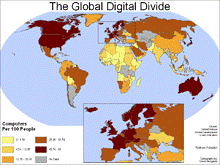Opposition to capital market integration
Main article: Anti-capitalist movements


World Bank Protester, Jakarta, Indonesia.
Capital markets have to do with raising and investing moneys in various human enterprises. Increasing integration of these financial markets between countries leads to the emergence of a global capital marketplace or a single world market. In the long run, increased movement of capital between countries tends to favor owners of capital more than any other group; in the short run, owners and workers in specific sectors in capital-exporting countries bear much of the burden of adjusting to increased movement of capital.[238] It is not surprising that these conditions lead to political divisions about whether or not to encourage or increase international capital market integration.
Those opposed to capital market integration on the basis of human rights issues are especially disturbed by the various abuses which they think are perpetuated by global and international institutions that, they say, promote neoliberalism without regard to ethical standards. Common targets include the World Bank (WB), International Monetary Fund (IMF), the Organisation for Economic Co-operation and Development (OECD) and the World Trade Organization (WTO) and free trade treaties like the North American Free Trade Agreement (NAFTA), Free Trade Area of the Americas (FTAA), the Multilateral Agreement on Investment (MAI) and the General Agreement on Trade in Services (GATS). In light of the economic gap between rich and poor countries, movement adherents claim "free trade" without measures in place to protect the under-capitalized will contribute only to the strengthening the power of industrialized nations (often termed the "North" in opposition to the developing world's "South").


General Assembly meeting of the Occupy movement in Washington Square Park, New York City, USA, on 8 October 2011
Global justice and inequality
Main article: Global justice movement
The global justice movement is the loose collection of individuals and groups—often referred to as a "movement of movements"—who advocate fair trade rules and perceive current institutions of global economic integration as problems.[239] The movement is often labeled an anti-globalization movement by the mainstream media. Those involved, however, frequently deny that they are anti-globalization, insisting that they support the globalization of communication and people and oppose only the global expansion of corporate power.[240] The movement is based in the idea of social justice, desiring the creation of a society or institution based on the principles of equality and solidarity, the values of human rights, and the dignity of every human being.[241][242][243] Social inequality within and between nations, including a growing global digital divide, is a focal point of the movement.
|
|
|


The global digital divide: Computers per 100 people.
Anti-consumerism
Main article: Anti-consumerism
Anti-consumerism is the socio-political movement against the equating of personal happiness with consumption and the purchase of material possessions. The term "consumerism" was first used in 1915 to refer to "advocacy of the rights and interests of consumers" (Oxford English Dictionary), but here the term "consumerism" refers to the sense first used in 1960, "emphasis on or preoccupation with the acquisition of consumer goods" (Oxford English Dictionary). Concern over the treatment of consumers has spawned substantial activism, and the incorporation of consumer education into school curricula. Anti-consumerist activism draws parallels with environmental activism, anti-globalization, and animal-rights activism in its condemnation of modern corporations, or organizations that pursue a solely economic interest. One variation on this topic is activism by postconsumers, with the strategic emphasis on moving beyond addictive consumerism.[5]
In recent years, there have been an increasing number of books (Naomi Klein's 2000 No Logo for example) and films (e.g. The Corporation & Surplus), popularizing an anti-corporate ideology to the public.
Opposition to economic materialism comes primarily from two sources: religion and social activism. Some religions assert materialism interferes with connection between the individual and the divine, or that it is inherently an immoral lifestyle. Social activists believe materialism is connected to global retail merchandizing and supplier convergence, war, greed, anomie, crime, environmental degradation, and general social malaise and discontent.
|
|
|
Anti-global governance
Main article: Global governance
Since the two world wars, there has been solid opposition to the idea of a world government, as advocated by organizations such as the World Federalist Movement (WFM). Those who oppose global governance do so on objections that the idea is infeasible, inevitably oppressive, or simply unnecessary.[244] In general, these opponents are wary of the concentration of power or wealth that such governance might represent. Religious reasons are also cited, in which global governance is seen as the Biblical Antichrist or a representation thereof (see New World Order (conspiracy theory)). Such reasoning dates back to the founding of the League of Nations and the United Nations.
Environmentalist opposition


Deforestation of the Madagascar Highland Plateau has led to extensive siltation and unstable flows of western rivers.
Main article: Environmentalism
Environmentalism is a broad philosophy, ideology[245][246][247] and social movement regarding concerns for environmental conservation and improvement of the health of the environment, particularly as the measure for this health seeks to incorporate the concerns of non-human elements. Environmentalism advocates the preservation, restoration and/or improvement of the natural environment in an attempt to balance relations between humanity and their broader natural environment. The exact nature of this balance is controversial and there are many different ways for environmental concerns to be expressed in practice. Environmentalism and environmental concerns are often represented by the color green,[248] but this association has been appropriated by the marketing industries and is a key tactic in the art of Greenwashing. Environmentalist concerns with globalization include issues such as global warming, climate change, global water supply and water crises, inequity in energy consumption and energy conservation, transnational air pollution and pollution of the world ocean, overpopulation, world habitat sustainability, deforestation, biodiversity and species extinction.
Конец формы
Дата добавления: 2018-04-05; просмотров: 251; Мы поможем в написании вашей работы! |

Мы поможем в написании ваших работ!
